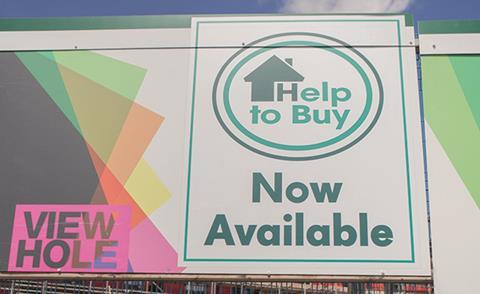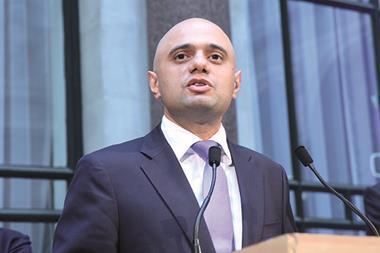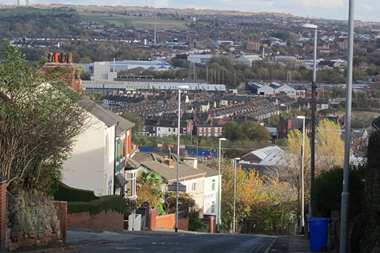The government has embarked on a review of the Help to Buy housing scheme, which could result in it being wound down or replaced before its scheduled end in April 2021.

The Department for Communities and Local Government (DCLG) has asked the London School of Economics (LSE) to conduct an independent evaluation as part of the review.
The LSE report will be delivered to the DCLG after it has heard the views of interested parties including the Home Builders Federation (HBF), small and large housebuilders and housing charities.
Property Week understands that the DCLG is not ruling out any option, including scrapping the scheme entirely.
Issues under review are believed to include the introduction of a tapering system before the end of the scheme, under which assistance to homebuyers would be gradually reduced in the run-up to April 2021. Housebuilders have been lobbying for tapering to be introduced as an alternative to the ‘cliff-edge’ proposal, which would see demand drop sharply after the scheme ends.
No mention
The government, which made no mention of Help to Buy in its 2017 election manifesto, is also understood to be considering more stringent criteria for applicants. This could include the scheme being restricted to first-time buyers; a reduction in the maximum sale price; or a lowering of the maximum household income. Tougher affordability hurdles could also be introduced.
The government may also implement closer independent monitoring of prices charged for Help to Buy properties to ensure they match those of equivalent non-Help to Buy homes.
A spokesman from the DCLG confirmed the government was considering the future of Help to Buy.

“We have committed £8.6bn for the scheme to 2021, ensuring it continues to support homebuyers and stimulate housing supply,” he said.
“We also recognise the need to create certainty for prospective homeowners and developers beyond 2021, so will work with the sector to consider the future of the scheme.”
Help for developers
David O’Leary, HBF policy director, said the scheme had played a key role in delivering new homes.
“The future of the scheme is a critical factor in the investment decisions being made by housebuilders up and down the country,” he said.
“The HBF and its members are supporting the government’s independent evaluation of the scheme, led by the LSE, which will demonstrate the important role the scheme is playing in driving up the delivery of new homes and getting households on to the housing ladder.”
Story update
After housebuilder shares fell in early trading this morning, a spokesman for DCLG added: “The department regularly reviews the Help to Buy Equity Loan Scheme, with the last review taking place in 2015. To infer from this that the Help to Buy Equity Loan scheme will be cancelled is simply incorrect.”
Impact of Help to Buy on housebuilders
How reliant are homebuilders on Help to Buy?
Across England around 30% of private completions have made use of Help to Buy over recent years. In the listed space, the highest exposure is at Persimmon (over 50% of private completions) and lowest at Berkeley (below 5%) and McCarthy & Stone (0 as all retirement homes). Help to Buy creates a distinct advantage for the new build sector, as it allows purchase of new build properties with only a 5% deposit but providing attractive interest rates at below 2%. Purchasing new build with Help to Buy can be 15-20% cheaper than renting and up to 30% cheaper than buying with a 95% LTV mortgage.
What could be the potential impact on earnings?
Assuming around 40% of private volumes use HTB and these have not incurred a 400-500bps incentive costs, we estimate this would result in a 2% margin impact or 10% of earnings. Volumes could also be impacted. Industry estimates suggest this scheme has resulted in around a 15% boost to volumes.
The final variable which is hard to estimate is the impact on pricing, to the extent new build prices have benefitted from the existence of the subsidy. The impact will depend heavily on whether there is an unexpected abrupt end to the scheme or a taper or an end which has long lead times, which would allow the industry to adjust well in advance by pricing in a new environment into new land purchases.
Gregor Kuglitsch, head of European building & construction research, UBS
Nick Whitten, residential research director at JLL, believes that while Help to Buy has helped just under 121,000 people buy new homes, it has supported developers even more.
“The majority of plc housebuilders have been reliant on the scheme to support their building programmes, and without a clear plan for after Help to Buy is withdrawn, delivery volumes could suffer,” he said.
Last week, the government proposed to withdraw Help to Buy support from new-build leasehold houses as part of its crackdown on the abuse of leaseholds.































No comments yet